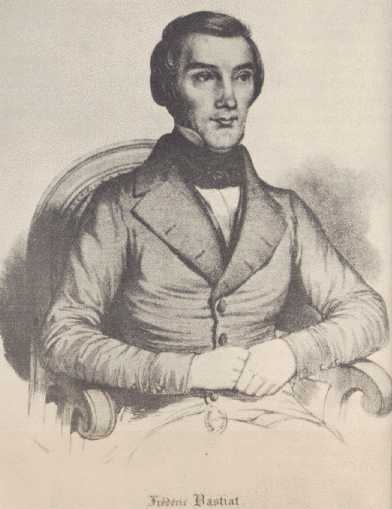Liberty Matters
Bastiat’s Isolation
 David Hart writes: "as an economic theorist Bastiat had great promise and some startlingly original insights, but he died before he could bring it all together into a coherent whole." I agree.
David Hart writes: "as an economic theorist Bastiat had great promise and some startlingly original insights, but he died before he could bring it all together into a coherent whole." I agree.And David is amazed - as am I - that Bastiat learned economics largely in isolation. Bastiat was never, of course, a member of an economics faculty, and he didn't move to Paris from his remote province until he was in his mid-40s.
But Bastiat did read … and read … and read. Obviously he also thought and pondered, with great seriousness, throughout all this reading.
Bastiat's path to economic insights is not recommended. But perhaps it has some benefits - benefits that, given his obvious natural genius, Bastiat was able to enlarge to such a degree that they swamped the significant costs of that path.
Bastiat could think for himself, judge for himself, without pressure from official Experts or Professors to adapt his thinking so that it conformed better to conventional wisdom.
At the risk of blaspheming the author of "What Is Seen and What Is Not Seen," it is at least worth asking if Bastiat would have ever become Bastiat had he been born 100 years later and served on a mid-20th-century economics faculty in the United States or western Europe. Were Bastiat's birth year 1901 (rather than 1801) and were he a son of Paris or London or New York (rather than of a small burgh in southwestern France), might this genius of a man have found himself teaching and researching at the likes of Cambridge or M.I.T. and, as a result, absorbing unawares the scientistic presumptions that infected economics then and there (and that still, in 2013, infect too much economics everywhere)? Might Fred Bastiat, professor of economics at M.I.T., have turned his genius to justifying or even expanding upon Keynesianism?
Even if an imaginary Fred Bastiat of 20th-century America had somehow come into this world with every predisposition possessed by the actual Bastiat, would the 20th-century version have been able to resist the peer pressure to treat economics as if it were a branch of physics? Would the hypothetical 20th-century version of Bastiat have seen as clearly as the real Bastiat the flaws of Keynesian-style free-lunch thinking? Might the 20th-century Bastiat be known to us today as history's greatest popularizer of Keynesian notions?
Economics, I'm certain, is no different from any other discipline or profession. To climb to the top and to win the applause of colleagues, a scholar's work cannot be too iconoclastic. A scholar must be part of the ongoing professional conversation. Therefore, even if a scholar has something earth-shatteringly brilliant to say, if that something is too far distant from the mainline of the professional conversation, it is unlikely to be heard and even less likely to be understood and appreciated. That scholar will sound like a kook to his or her peers even if in truth he or she is a pioneering genius.
I do not say that a 20th-century Prof. Fred Bastiat would really have been fundamentally different from the 19th-century's Frédéric Bastiat (save to point out that the former would likely not have died of throat cancer at so young an age). But we should recognize this possibility.
Perhaps we owe to Bastiat's isolation a great deal of the thanks due to those forces that enabled this remarkable man to produce such a brilliant stream of not only powerful pamphleteering but also pioneering scholarship.
Copyright and Fair Use Statement
“Liberty Matters” is the copyright of Liberty Fund, Inc. This material is put on line to further the educational goals of Liberty Fund, Inc. These essays and responses may be quoted and otherwise used under “fair use” provisions for educational and academic purposes. To reprint these essays in course booklets requires the prior permission of Liberty Fund, Inc. Please contact oll@libertyfund.org if you have any questions.